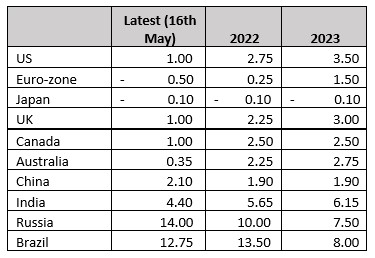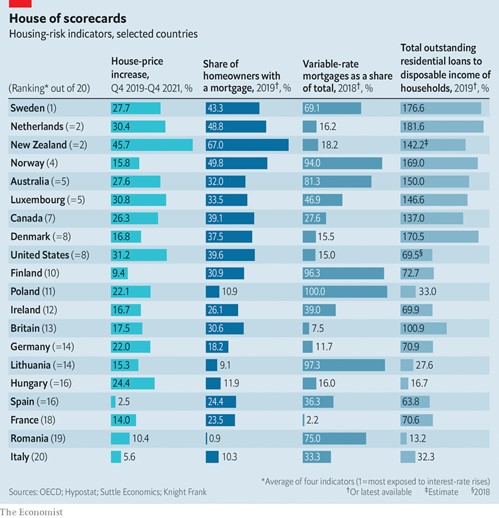Cash buyers, assessing housing market risk and the rental boom
Your international property and economics update tracking, analysing and forecasting trends from around the world.
3 minutes to read
The appeal of property
Equities are proving volatile, crypto has had a bad week and inflation is threatening pension performance. Will this heighten the appeal of property? Its traditional role as an inflation hedge is in the spotlight once more.
Global stock markets fell 8% in April and are down 11% so far in 2022 as investors price in higher interest rates and lower economic growth. The collapse of the cryptocurrency Terra knocked 15-25% off the value of most major cryptocurrencies, meanwhile pensions are seeing their cap on inflation protection breached as the cost-of-living surges.
But inflationary pressures also mean mortgage rates are rising. While this is likely to soften buyer sentiment in the mainstream market, at the prime end where cash buyers predominate demand is likely to remain robust.
The table below sets out where Capital Economics forecasts interest rates will sit at the end of 2022 and 2023 in key economies. Emerging markets are in the eye of the storm, developed nations will also see rises, albeit from a much lower base.

As the world transitions from a pandemic to a post-pandemic landscape, this new market cycle will see the power balance recalibrate in favour of buyers - in particular cash buyers.
House prices
With rates rising which global housing markets are most exposed? The Economist used Knight Frank data last week to assess exactly that. It points out that house prices are unlikely to plummet but that the pain of rising mortgage rates will be harder to bear in some countries than others.
Tracking several metrics including the number of households with mortgages, those on variable rates and the rate of price growth since the start of the pandemic, the results show Sweden and the Netherlands, with their highly indebted households, are most at risk of a slowdown.
Britain by comparison sits in 13th place. France, with only 2.2% of households in possession of a variable-rate mortgage sits in 18th place, and Italy, where house price growth has been slow compared to several western nations, faces the lowest risk.

US buyers
The euro is close to parity with the dollar for the first time in 20 years. What does this mean for property markets? The purchasing power of US dollar buyers is likely to strengthen further this year, particularly in Europe.
The dollar has become supercharged in part due to safe-haven flight in response to the crisis in Ukraine but also due to the Federal Reserve hiking interest rates faster than its peers.
Knight Frank agents in Paris, the South of France, Monaco, Switzerland, Italy and Barcelona are reporting stronger US demand.
US buyers accounted for 14% of Knight Frank’s European and Caribbean sales in 2021, despite travel restrictions, up from 9% in 2019 prior to the pandemic. Data from the Spanish Council of Notaries shows US buyers on average spend 30% more than the average overseas buyer.
Rents
Prime rents continue to soar in major cities worldwide. The return of office workers, international students and corporate tenants are together bolstering demand leaving rental stock a rare commodity.
The latest data for Manhattan shows luxury rents increased 33% in the year to April reaching a median rental price of $10,000 per month. This was the second highest rate on record, according to our colleague Jonathan Miller, with rental inventory down 77% year-on-year.
London is witnessing a similar trend. Rents in prime central London are 9% above their pre-pandemic level and up 29% in the year to April 2022. The market looks set to remain strong over the summer, but all eyes are on the sales market - as and when it starts to slow, supply in the rental market may start to increase.
With this trend set to continue keep an eye out for our new Prime Global Rental Index which will track the movement in luxury rents across 10 global cities each quarter.
In other news
At 9%, Britain’s inflation rate hits a 40-year high, consumer confidence tumbles in Canada as its housing market reverses, home prices in China tumble for the eight consecutive month during lockdowns and Singapore extend its Additional Buyer Stamp Duty to Living Trusts.